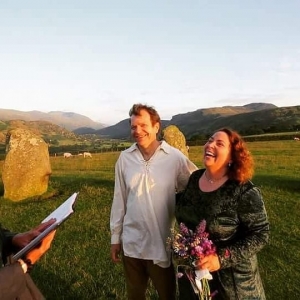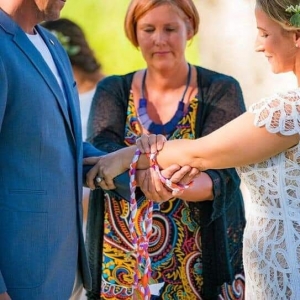Do you charge what you’re worth? Are you worth what you charge?
Guest post by Celebrant Jennifer Cram
Two simple questions to which it is impossible to answer YES or NO because a whole raft of complex considerations apply.
Before diving into those, let’s meet the little herd of elephants lurking in the corner of the celebrancy room:
- The notion that it is possible to accurately convert abstract concepts of worth and value into a cash price
- The belief that what a couple is prepared to pay you in cold hard cash accurately reflects how much they value you and the service you provide
- The suggestion that celebrants who charge less than you do, do so because they are average or mediocre

How do you translate “What I’m Worth” into an accurate cash amount?
There is a method. It is easy. It is simple. It is subjective. And it is invariably wrong.
What you assess your own value to be depends on your frame of reference. Your frame of reference depends on
- your previous experience of monetizing yourself (aka salary history)
- what your lifestyle needs are
- what your competition is charging, and
- where and how you run your business.
What I’m Worth is an aspirational concept, influenced by how much you need to earn to support your current lifestyle, or the lifestyle you aspire to. This is different from an objective assessment of how much you need to charge to cover the cost of doing business, though that may be part of your calculations.
The simple reality that many “expenses” attached to being a celebrant are not tax-deductible also plays a significant role. One of these is what you wear when officiating. Unless you wear a uniform with a visible registered logo, regardless of whether it is part of your “trademark look”, the taxman classifies your wardrobe as normal wear.

Jake and Lyndsay’s wedding ceremony officiated by Veronika Robinson. Photography by John Hope.
What I’m Worth is also influenced immensely by the frame of reference of those who mentor, advise, or train you.
Beginning celebrants are often advised to charge big bucks from the outset. Some openly confide in other celebrants that they charge big because that leads couples to assume they are highly skilled and experienced. Which creates a dilemma for the profession as a whole. For some beginning celebrants, the need to appear experienced may also drive not just pricing, but also the tone of advertising.
In other occupations, accumulated skills and knowledge, acquired over time, are seen as deserving of a fee premium. The knowledge and the wisdom of elders in the profession is valued and paid for. Apparently not so in celebrancy where there appears to be an uptick in overt ageism in advertising that promotes by exclusion – “Not one of the blue rinse brigade.” “Not your mother’s friend type of celebrant.“ Such claims send a mixed message that ours is a profession that attaches value to self-confidence above knowledge and experience. A message that, incidentally, insults the parents and grandparents of dream couples together with all of those 20 to 30-somethings who appear to have a monopoly on blue-dyed locks.

Lincoln and Deborah’s ceremony at Castlerigg Stone Circle officiated by Veronika Robinson.
I’m the better celebrant because I charge more
No, you did not misread that! It is the logical corollary to the claim by celebrants that those who charge less than they do must do so because they are average or mediocre. Which suggests that those who can’t afford your fee are somehow less deserving of excellent services. Both excellence and mediocrity come at all price points.
When you are running a business you choose your niche, and target what you offer and what you charge, accordingly. Though rarely articulated, the niche you choose should align with your philosophical approach to your wider purpose.
If your purpose is to feed people, a stall offering traditional street food and an expensive restaurant offering similar cuisine both meet the same need and satisfy the same basic requirement: an enjoyable food experience that satiates the hunger of your customers.
Price alone is no assurance of quality. We’ve all seen bad reviews of expensive restaurants and rave reviews of street food stalls. And we’ve all seen upmarket establishments go bust while downmarket ones in a similar niche go from strength to strength. It’s not about what you charge, it is about what your margin is.

Your first variable
Harking back to my previous life as a manager of large libraries, there is wisdom from subject cataloguing of (physical) library books that I frequently refer to. A book can only sit on one place on the shelves. Similarly, a celebrant’s choice of primary variable (category, subject, or, in the case of running a business, motivation) drives and influences everything.
If your first variable is money, the magical six or seven figure annual earnings, your ideal client will be a high-end one, with other characteristics lined up behind that.
If money is the first variable of your mentors or the business-oriented coaches you follow, the advice they give will be skewed by that variable, though often presented as advice that equates success with earnings.
Your location and your past earning history
Location influences cost because location influences living expenses and the cost of doing business. All of which influences salaries. Which in turn influences perception of affordability. And appropriate choices. A Rolls Royce and a Ford Fiesta will get you from point A to point B in exactly the same time. Whether a Rolls is seen as the better choice, or the only one, will be influenced by the neighbourhood. On what the Jones’s next door perceive to be socially acceptable. Likewise, an individual’s perception of a good hourly rate and a good overall annual salary will differ depending on who they work for and the industry. Stock Broker versus Stock Clerk for example. You get the picture.
What your competition and/or peers charge
Differentiating between What I’m worth and What I must be worth because the people I benchmark against charge that amount can be a cognitive challenge. Setting a fee without doing a full costing is highly problematic, and risky. Matching the market is a legitimate strategy. Matching the market without doing a full costing or taking a forensic eye to your business expenses may cause difficulties sooner or later.
Non-monetary recompense
Every ceremony we are booked for gives us a unique opportunity to learn new skills, develop our craft, and accumulate new knowledge. Unlike money, which can be here today and gone tomorrow, knowledge and improved skills are a form of recompense for time spent that can never be taken away from us. Ceremony by ceremony we build our market value. That may not mean we can charge a higher fee. But it certainly can affect our total bottom line. The more attractive you are, the more in demand you are going to be and the more ceremonies you have, through the magic of amortization, the lower your fixed costs per ceremony will be.
Willingness to pay as a measure of value
What your couples are willing to pay you has very little to do with how much they value your services.
Especially misleading (to celebrants!) is any assumption that couples who pay more value their celebrant more. For high-end clients (the most common type of “dream couple”) a $1500 may be a drop in the bucket, and hence not a reliable measure of how much they value what they are purchasing for that amount. Whereas for someone on minimum wage, a $500 fee may represent sacrificial spending. The widow’s mite for those of you who went to Sunday school. An amount they have had to save for and/or forgo other things to afford. Thus, much more accurate of how much they value their celebrant.
It might also be a mark of how desperate they are. We’ve all gritted our teeth and paid way more than we can really afford to have a plumber come out after hours to fix a problem that’s impossible to live with until normal business hours (and costs) kick in. For couples it may be that they’ve procrastinated and have to lock a celebrant in quickly in order to legally marry or for some other reason, or that it is a very popular day and so far every celebrant they’ve contacted has been booked.

When you link value with what they pay it comes down to
- what amount of money represents to them
- how hard they’ve had to work to earn it, and
- what percentage of their total resources it represents.
A way to clarify this is to use a surrogate for money. Time. Someone on minimum wage ($21.38 per hour before tax in Australia) would have to work 23 hours and 23 minutes to afford a $500 fee. Whereas someone on $100 an hour would only have to work 15 hours to afford a $1500 fee. Where passive income is involved, no time at all could be expended. If a couple makes no effort to earn the money they spend on you, and/or need to make no sacrifices or juggle and trim their wedding budget elsewhere, how can that amount be a measure of your worth or how much they value you? It can’t. And it isn’t.

My advice?
Your fee is your fee. What you charge is a complex and personal mix of maths and motivation that only you can calculate. You don’t need to justify it. You certainly don’t need to affirm yourself by justifying it in a way that both subtracts value from other celebrants through criticism and subtracts value from using a celebrant as a service option.









